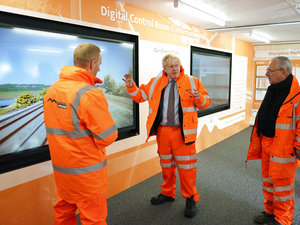UK Government Faces Criticism over High-Speed Rail Revisions

The British government came under fire Thursday for scrapping a long-planned high-speed rail line to the northern English city of Leeds as part of a package of revisions that reduces costs by tens of billions of pounds.
Critics argue that the scaling back of plans will leave many parts of northern England at an economic disadvantage, and runs against Conservative Prime Minister Boris Johnson's stated ambition to "level-up" the country, by spreading prosperity away from London and other wealthy parts of southern England.
In an announcement to lawmakers, Transport Secretary Grant Shapps said the planned extension of the new high-speed rail line, known as HS2, from the East Midlands to Leeds has been scrapped and that the new high-speed trains will run on existing lines. He also said that a high-speed rail line linking Leeds with Manchester, which is around 45 miles (72 kilometers) away, will now be a combination of new track and enhancements to existing infrastructure.
HS2, which is intended to slash journey times, is being built in stages with the first one linking London with the central England city of Birmingham. From there, the original intention was to build further lines up to Manchester and Leeds. The high-speed line to Manchester will still go ahead.
The decision to cut back HS2 will make journeys between Leeds and London 32 minutes longer than previously planned.
Shapps insisted that the 96 billion-pound ($130 billion) Integrated Rail Plan would slash journey times across northern and central parts of England with 110 miles (177 kilometers) of the new high-speed line, and said the benefits will come a "decade or more" earlier than under the previous plan.
"This plan will bring the north and the Midlands closer together, it will fire up economies to rival London and the South East, it will rebalance our economic geography, it will spread opportunity, it will level up the country," he said.
For decades, a North-South wealth divide has been evident in England. Successive governments have sought to bridge that gap and the new high-speed rail links were promoted as a way of enticing investment into the north of England away from southern areas, notably in and around London.
The north of England, which used to be the economic powerhouse of the British economy, has suffered in recent decades as many of the old industries that facilitated its success, such as coal, cotton and shipbuilding, have all but disappeared.
Johnson won a hefty majority at the last general election in 2019 by promising to do something about this divide, winning scores of seats in what had historically been the heartland of the Labour Party.
The prime minister was travelling Thursday on trains stopping at locations affected by the plan and meeting with rail staff.
The main opposition Labour Party said the revised package outlined by the government abandoned previous assurances given on the extension of HS2 and the so-called Northern Powerhouse Rail, which would link up the major cities in the north of England.
Labour transport spokesman Jim McMahon said it was a "betrayal of trust."
